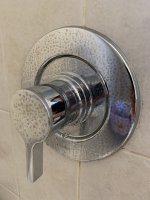John Clint
New Member
Hi all.
Just wondering if anyone noticed a discoloration of some surfaces during using a water softener. See picture for example.
Our conditions:
Just wondering if anyone noticed a discoloration of some surfaces during using a water softener. See picture for example.
Our conditions:
- Water is soft, softener working just fine (tested).
- TDS about 200
- Hardness 10gpg
- No iron or manganese.
- Spotting/discoloration noticeable on the surfaces mostly in showers (daily wet/dry conditions)
- Chrome, tempered glass, stainless steel
- None of the cleaning solutions couldn't help.


